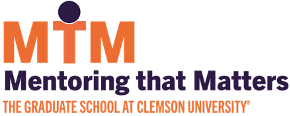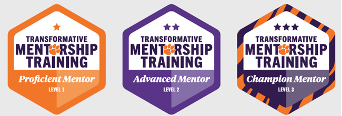- About
-
Academics
- Academics Overview
- Course Numberings
- Deadlines for Completing Your Program
-
Theses and Dissertations
- Theses and Dissertations Overview
- Formatting Requirements
- Templates, Links and Tools
- Plain Language Abstracts
- Plagiarism
- Defending Your Thesis or Dissertation
- Converting Your Manuscript
- Requesting an Embargo
- Submitting
- Revising
- Finishing the ETD Process
- Bound Copies
- Survey of Earned Doctorates
- Thesis and Dissertation FAQs
- Policies and Procedures
- Forms and Requests
- Plan of Study
- Graduation Ceremonies
- Graduate School Interdisciplinary Program
- Admissions
- Cost and Aid
- Professional Development
- Student Services and Groups
MTM: Mentoring that Matters - Mentoring Sessions for faculty

Mentorship defined: “A professional, working alliance in which individuals work together over time to support the personal and professional growth, development, and success of the relational partners through the provision of career and psychosocial support.” (NASEM, 2019)
What does the evidence say? Mentorship is essential in:
- Determining the success of students and scholars;
- Persistence of aspiring students and scholars;
- Formation of scholarly, scientific, and cultural identities.
- One size does not fit all.
- Clear communication is the key.
For more information, contact Dr. Karen High (khigh@clemson.edu) or Dr. Marieke Van Puymbroeck (mvp@clemson.edu).
MTM Training Series available for Faculty and Post-Docs (see below for details/learning objectives):
-
Aligning Expectations
One critical element of an effective mentor-mentee relationship is a shared understanding of what each person expects from the relationship. Problems between mentors and mentees often arise from misunderstandings about expectations. Importantly, expectations change over time, so frequent reflection and clear communication about expectations are needed on a regular basis.
Learning Objectives:
- Listen to and consider the expectations of the mentee in the mentoring relationship.
- Clearly communicate expectations for the mentoring relationship.
- Align mentee and mentor expectations.
- Consider how personal and professional differences may impact expectations.
-
Maintaining Effective Communication
Good communication is a key element of any relationship, and a mentoring relationship is no exception. It is critical that mentors reflect upon and identify characteristics of effective communication and take time to practice communication skills in the session and with their mentees. As mentors, it is not enough to say that we know good communication when we see it.
Learning Objectives:
- Provide constructive feedback.
- Communicate effectively across diverse dimensions.
- Identify different communication styles.
- Engage in active listening.
- Use multiple strategies for improving communication.
-
Assessing Understanding
Determining whether mentees understand core concepts about the research they are doing is critical in a productive mentoring relationship - though this is surprisingly difficult to do. Developing strategies to assess how well mentees understand the purpose of their project, underlying principles, and the context of their work is an important part of becoming an effective mentor. Moreover, it is important for mentors to be able to identify the causes for confusion and develop strategies to address misunderstandings.
Learning Objectives:
- Assess mentee’s understanding of core concepts and processes as well as the ability to develop and conduct a project and present outcomes.
- Identify reasons for a lack of understanding, including expert-novice differences.
- Use multiple strategies to enhance mentee understanding across diverse disciplinary perspectives.
-
Promoting Independence
An important goal in any mentoring relationship is helping the mentee become independent; yet defining what an independent mentee knows and can do is often not articulated by the mentor or the mentee. Defining what independence looks like and developing skills to foster independence are important to becoming an effective mentor. Defining independence becomes increasingly complex in the context of highly collaborative projects.
Learning Objectives:
- Define independence, its core elements, and how those elements change over the course of a mentoring relationship.
- Create an environment in which mentees can achieve goals.
- Identify benefits and challenges of fostering independence, including conflicting goals of fostering independence and achieving mentor research objectives.
-
Establishing a Practice of Inclusion
Diversity, in many dimensions, offers both challenges and opportunities to any relationship. Learning to identify, reflect upon, learn from, and engage with diverse perspectives is essential to fostering effective mentoring relationships and vibrant intellectual environments.
Learning Objectives:
- Increasing understanding of community, engagement, belonging and access, and their influence on mentor-mentee interactions.
- Recognize the impact of conscious and unconscious assumptions, preconceptions, biases, and prejudices on the mentor-mentee relationship and acquire skills to manage them.
- Identify concrete strategies for learning about and addressing issues of equity and inclusion.
-
Fostering Work-Life Integration
Graduate students experience high rates of anxiety and depression that can result in strained mentor-mentee relationships, slowed degree progress, and other more serious outcomes. Mentors usually are not trained mental health professionals, though we do often have close professional relationships with mentees. Building a strong understanding of the boundaries of your responsibilities with regard to mentee mental health is critical to positive experiences for both the mentor and mentee. Learn how to provide a professional and mentally healthy work environment.
Learning Objectives:
- Recognize the importance of proactive well-being for mentors and mentees.
- Explore the boundaries of legal, ethical, and moral responsibilities with regard to mentee mental health.
- Understand both the protective as well as the risk factors for graduate student mentee mental health.
- Identify concrete strategies for further supporting mentees who are experiencing mental health challenges and are already seeking counseling or other resources.
-
Promoting Professional Development
A goal of most mentoring situations is to enable the mentee to identify and achieve both academic and professional outcomes. Though learning to do disciplinary research, entrepreneurship, or creative artistry is an important academic outcome in mentoring relationships, there are many other outcomes that will influence a mentee’s future career. Mentors should consciously consider and support their mentees to achieve these other outcomes as well.
Learning Objectives:
- Identify the roles mentors play in the overall professional development of their mentees.
- Develop a strategy for guiding professional development.
- Engage in open dialogue on balancing the competing demands, needs, and interests of mentors and mentees.
-
Mentoring the Online Student
-
Dealing with Challenging Students
-
Mentoring Capstone: Building your Mentoring Philosophy
Reflecting upon your mentoring relationships is a vital part of becoming a more effective mentor. This is especially important following mentor training so that you can consider how to implement changes in your mentoring practice based on the training. Reflection on your mentoring practice at regular intervals is strongly encouraged.
Learning Objectives:
- Reflect on the mentor education experience.
- Reflect on any intended behavioral or philosophical changes across the mentoring competencies.
- Articulate an approach for working with mentees in the future.
Faculty can earn digital badges for participation in Workshops:

-
Level 1 – Proficient mentor (orange badge)
- Acquire 1-2 hours of training on mentoring best-practices.
- Educate yourself on mentoring concerns and best-practices in your department.
- Continue your mentor education by attending mentoring training or activities at least once a semester.
- Use authorship agreements with your students.
- Utilize compacts with your graduate students.
-
Level 2 - Advanced mentor (purple badge)
- Acquire at least six hours of training on mentoring best-practices.
- Provide resources for graduate students.
- Continue your mentor education by attending mentoring training activities at least once a semester.
- Utilize compacts with your graduate students.
- Update compacts annually or more frequently.
- Encourage your students to complete an individualized development plan (IDP).
- Review IDPs with your students annually and revise as needed.
- Include emphasis on mentoring excellence in federal/discipline specific grant proposals as suggested in the Grant Mentoring Plan Templates.
- Develop a mentoring philosophy statement and discuss with incoming and current students.
-
Level 3 - Champion badge (tiger badge)
- Complete all 10 trainings
- Participate in at least 2 of 4 Graduate Center for Transformative Mentorship quarterly meetings
- Develop new policies and practices in departments/units to ensure access to quality mentorship.
- Apply for intentional mentoring/training grants (as PI or investigator).
- Create/lead formal student mentoring groups.
- Sponsor seminar speaker with expertise in mentoring.
- Continue your mentor education by attending mentoring training or activities at least once a semester.
- Develop case studies specific to your discipline/department or college.
- Support new policies and practices in departments/units to ensure access to quality mentorship.
- Hold colleagues accountable for poor mentoring.
- Join professional associations that advocate for excellence in mentoring.
- Set up at least one mentor training for your department or college.
- Co-facilitate at least one mentor training for your department or college.
- If you are CIMER trained, facilitate at least one mentor training for your department, college, or the university.

